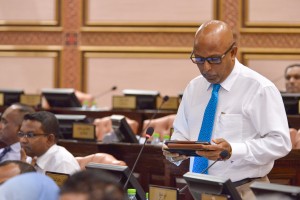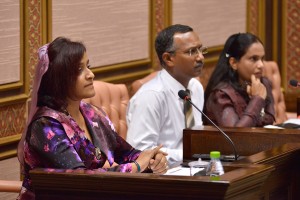The Maldives, as an independent and sovereign nation, is not obliged to consult other countries before making foreign policy decisions, foreign minister Dunya Maumoon told the People’s Majlis today.
The foreign minister appeared in parliament to respond to a question tabled by opposition Maldivian Democratic Party (MDP) MP Ahmed Nashid concerning the Maldives’ participation in the Chinese ’21st Century Maritime Silk Route’ initiative.
President of the People’s Republic of China Xi Jingping has called on the Maldives “to get actively involved” in the creation of a maritime trade route linking China to the east coast of Africa and the Mediterranean.
Nashid, MP for Shaviyani Komandoo, asked whether neighbouring countries in the Indian Ocean were consulted before the decision was made.
“If we join this project, is it likely that the longstanding close relations we have with neighbouring countries could be adversely affected?” he asked.
In response, Dunya noted that the agreement signed with the British in 1965 to secure independence “states in clear language that the Maldives is not obliged to consult or seek consent or approval from any other nation to implement Maldivian foreign policy.”
 Former Presidents Ibrahim Nasir and Maumoon Abdul Gayoom did not join any “military or political alliance” during the Cold War, she added, out of fear of losing the independence gained in 1965 as the Maldives would be obliged to consult major powers before making foreign policy decisions.
Former Presidents Ibrahim Nasir and Maumoon Abdul Gayoom did not join any “military or political alliance” during the Cold War, she added, out of fear of losing the independence gained in 1965 as the Maldives would be obliged to consult major powers before making foreign policy decisions.
“We should all know that the interest of any foreign country should not take precedence over Maldivian national interest,” she said.
MDP MP Ibrahim Mohamed Didi – a retired brigadier general – asked whether relations with India could deteriorate if Chinese naval activity is conducted in a Maldivian port, which would threaten Indian “geopolitical interests”.
Dunya declined to answer citing national security concerns and advised raising the issue through parliamentary committees.
Asked if India has expressed concern with the decision, Dunya said the Indian government also welcomed the Silk Route initiative during Chinese President Xi’s visit to New Delhi in September.
Foreign policy
Dunya said President Abdulla Yameen’s foreign policy was based on Article 115(d) of the Constitution, which states that the president has a duty “to guarantee the independence and territorial integrity of the Maldives, and to promote respect for national sovereignty in the international community.”
The government decided to participate in the Silk Route initiative as it would promote national interest and benefit the Maldivian people through trade and commerce, she said.
Dunya referred to a joint communique issued during President Xi’s state visit in the Maldives in September, which declared that the Maldives “welcomes and supports the proposal put forward by China to build the 21st Century Maritime Silk Road, and is prepared to actively participate in relevant cooperation”.
Fostering ties with South Asian countries and ensuring national security was one of the most important aims of the government’s foreign policy, she continued, noting that Maldivian security was intertwined with Indian Ocean regional security.
 The Maldives would consult all nations and work together to ensure regional security and stability, she assured.
The Maldives would consult all nations and work together to ensure regional security and stability, she assured.
Former President Mohamed Nasheed has criticised the decision to join the Silk Route initiative, contending that it would threaten Indian Ocean security and risk putting the Maldives in the middle of war or disputes between Asian powers.
China’s rising economic presence in the Indian Ocean region has stoked concerns in New Delhi that China is creating a “string of pearls” to encircle India, including Chinese investments in ports and other key projects in Sri Lanka and Pakistan.
Asked if closer ties with China would adversely impact relations with India or Japan, President Yameen told reporters upon returning from a visit to China in August that Sino-Maldives economic cooperation would not affect “the very friendly, close relations with India”.
“All these projects are also open to India and we are doing a lot of diplomatic work with India,” he said, referring to his administration’s decision not to sign a Status of Forces Agreement (SOFA) with the United States as an example of cooperation.